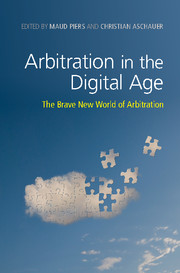Book contents
- Arbitration in the Digital Age
- Arbitration in the Digital Age
- Copyright page
- Contents
- Contributors
- Foreword
- Introduction
- 1 Survey on the Present Use of ICT in International Arbitration
- Part I The Use of Technology in International Arbitration
- Part II Arbitration, Arbitrators, Counsel and the Internet
- Index
Part II - Arbitration, Arbitrators, Counsel and the Internet
Published online by Cambridge University Press: 12 January 2018
- Arbitration in the Digital Age
- Arbitration in the Digital Age
- Copyright page
- Contents
- Contributors
- Foreword
- Introduction
- 1 Survey on the Present Use of ICT in International Arbitration
- Part I The Use of Technology in International Arbitration
- Part II Arbitration, Arbitrators, Counsel and the Internet
- Index
Summary
Electronic arbitration agreements and electronic arbitral awards test the boundaries of traditional form provisions. Arbitration agreements must typically be concluded in writing and may need to be submitted to court. Arbitral awards usually have to be rendered in writing and have to bear the arbitrators’ signatures, have to be delivered to the parties and have to be submitted to court in order to be recognized and enforced. A multitude of national laws, which are harmonized only in part, govern these issues. If arbitration agreements or arbitral awards are invoked before foreign courts, the same issues of form are even governed by another legal regime. This contribution undertakes to distinguish the relevant scenarios and to identify the applicable rules in each case.
- Type
- Chapter
- Information
- Arbitration in the Digital AgeThe Brave New World of Arbitration, pp. 149 - 299Publisher: Cambridge University PressPrint publication year: 2018

